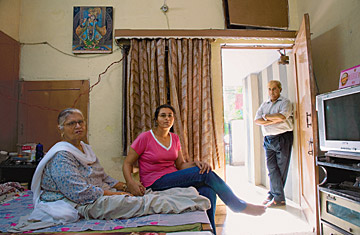
Meet the Malhotras
Santosh (left) suffered through Partition; her son Jetendar (right) achieved modest prosperity; granddaughter Yukti has high hopes
(2 of 3)
With both his parents working, Jetendar Malhotra spent much of his childhood at home with his three brothers. He liked school, he says, but also got into trouble occasionally for pulling pranks on teachers and classmates. He loved playing cricket and badminton. By the beginning of the 1960s, India's direction for the next few decades had been set. Under the paternalistic watch of Jawaharlal Nehru, who led independent India for its first 17 years, the government poured money into education, gave more rights to women and criminalized caste discrimination. Economic policies were increasingly socialist and protectionist. The government began investing heavily in industry and agriculture, and nationalized companies in so-called strategic industries such as mining, banking and airlines. "The world saw us as a poor place," says Jetendar today. "And we were. The idea was to protect the country until we could survive against everyone else." But while high import taxes were good for the country in the short term, Jetendar says, they also meant goods such as televisions, cars and refrigerators weren't available or were too expensive for average Indians.
The shift to socialism and the "license Raj" — the government system of restricting competition in key industries to a handful of large family-owned companies — left India's economy mired in mediocrity. Economic growth averaged just 3.6% in the 1970s, a laggardly rate that barely kept up with population growth. Commentators dubbed India's performance "the Hindu rate of growth" as if the nation was doomed to poverty because of some innate flaw. With so much of the economy under state control, government jobs were often the best and safest option. After leaving school, Jetendar studied commerce via correspondence courses. During the day he would sell small electrical goods — irons, toasters, heaters — at a 40-50% markup. In a day he could make 300 to 500 rupees, $7.50 to $12.40 at today's exchange rates and a fortune in the early 1970s. But after trading for a few years, Jetendar decided on a government job — first at a state-owned chemical mill and then with the New Delhi tourism department. "Trading was temporary. I looked at it like, 'Today I have a business but tomorrow I might not.' With a government job the earning might not have been as much but it was guaranteed and the security was there for a long time."
For those without a job with the government or one of the heavily protected family-owned conglomerates, life was much tougher. Millions sought a new start in places like Britain and the U.S. One of Jetendar's cousins moved to London in the 1970s to marry an Indian there, and in 1976 Jetendar's family arranged for him to marry a girl in the U.K. But at the elaborate engagement party the family held in India, Jetendar's would-be father-in-law insisted he move to London. Jetendar refused. "I liked her," he says now. "But I wanted to stay in India."
In 1979 Jetendar began managing a state-owned liquor store in New Delhi. Three years later he bought his first scooter and the following year married Madhu, a Hindi teacher his mother Santosh had met when visiting a school. The couple had two girls, Yukti and Neeti. At one of two government-owned liquor stores Jetendar now helps manage, he shows me boxes of Indian whiskey that, at just over $1 per 750-ml bottle, is popular with working-class men. In the past few years, as the Indian middle class has grown and tastes have changed, government stores have also begun to sell wine. Jetendar recently attended a three-day wine-tasting course, though he admits that in his neighborhood "wine is not yet that popular." Jetendar spends most days sitting at a metal desk perched on a concrete mezzanine floor that juts out over the shop's basement. A fluorescent light casts an artificial glow across his books. A stint at a government catering company "was better," he says. "The office had air-conditioning." He pauses to look around his modest fief. "But you work hard wherever you are to make your kids' lives better. That's the way I look at it."